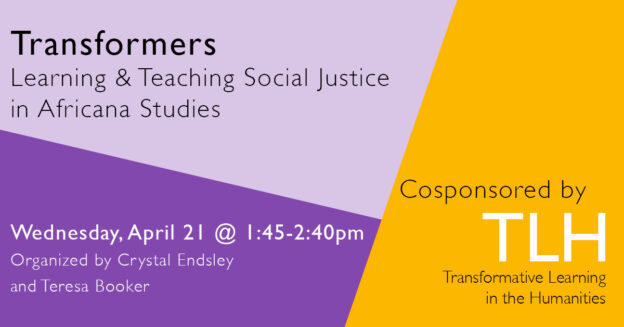This post was written by Contributing Author Dr. Crystal Leigh Endsley, Associate Professor of Africana Studies at John Jay College of Criminal Justice.
When I first began discussing the development of this TLH event proposal with my collaborator and co-conspirator for social justice, Dr. Teresa A. Booker, we hoped to accomplish two things. First, we wanted to demonstrate the vibrant and robust contributions of our small department. Second, we wanted the event itself to model the techniques we would be featuring in the content; namely, collaborative work.
In 2018, our department was concerned about consistency and meeting the needs of our students who enrolled in one of the required courses for our minor, Introduction to Africana Studies. This course is a 100-level survey course, which is popular with students, so we run multiple sections of the course in order to meet that demand. Our students, like our faculty, are incredibly diverse with varying levels of engagement and expertise in the field. To regulate the entry-level content that would be taught across sections and to ensure that students were exposed to key theories, historic events, and important figures in Africana Studies, Dr. Booker and I coordinated the development of zero-cost syllabus. The entire full-time faculty (Dr. Jessica Gordon-Nembhard, Dr. C. Jama Adams, Dr. Charlotte Walker-Said, and Dr. I. Xerxes Malki) along with two dedicated adjuncts, Dr. Carl Paris and Patricia Johnson-Coxx, provided support and assistance. Each full-time faculty member developed two weeks’ worth of modules on their areas of scholarship. The modules included only OER resources so that the students would not be required to purchase exorbitantly priced textbooks. The modules also included lesson plans connected to learning objectives and suggested in-class activities. Our hope was to provide as much support as possible for our adjuncts and full-time folks who instruct the sections of this foundational course while ensuring that our students were not unduly burdened with extreme financial hardship. With the dedication of a librarian, Verlene Harrington, the online resources were coordinated into a website link for each section, which maximized ease of access for our students. Little did we know, back in 2018, that our efforts to provide completely online and minimal cost readings and materials for this course would prove invaluable with the strain and stress of the pandemic in 2020!
The collaborative nature of this AFR 140 project is reflected and expanded in the second example that will be featured in our event. In my 241 general education course, Poetic Justice, we concentrate on exploring, developing, and analyzing spoken word poetry as it relates to social issues. Each time I offer this course, I coordinate co-sponsorship with various offices such as the Women’s Center for Gender Justice and the Center for Student Involvement and Leadership to bring living poets to my students in order to train them in new techniques. Last semester was no exception, and I featured Dr. Tony Keith, Jr. (www.tonykeithjr.com) who is an award-winning scholar and poet. Our artistry and scholarship models one way that collaboration occurs within and beyond the academic world and into the broader community. Earlier in 2020, Dr. Keith and I published an article that showcased a research methodology he developed named “Blackout Poetic Transcription,” and he trained my students in the process. In turn, my Fall 2020 class used that technique to complete their own research projects and performed their poetic findings publicly, many of them for the first time. Because we build bridges between the community and the academy through poetry and performance, Dr. Keith and I are adamant and intentional about furthering disruptions of power and privilege within our traditional scholarship as well. Encouraging our students to forge connections between their lived experience and the traditional research methods they learn as undergraduates invites them to think critically about how accessibility and collaboration can be fostered in tangible ways.
We hope to highlight and emphasize the ways right relationship allows us to grow and shine together during the event we are hosting. The imperative of Africana Studies is that each bit of scholarship and research must be relevant beyond the academy. In other words, accessibility and cooperation are necessary for transformative social justice pedagogy.
Dr. Crystal Leigh Endsley is Associate Professor of Africana Studies at John Jay College of Criminal Justice, City University of New York, where she was honored with the 2016 and the 2021 Distinguished Teaching Award. Crystal Leigh is an internationally renowned spoken word artist. Her research focuses on arts and culture as activism and social justice pedagogy.


